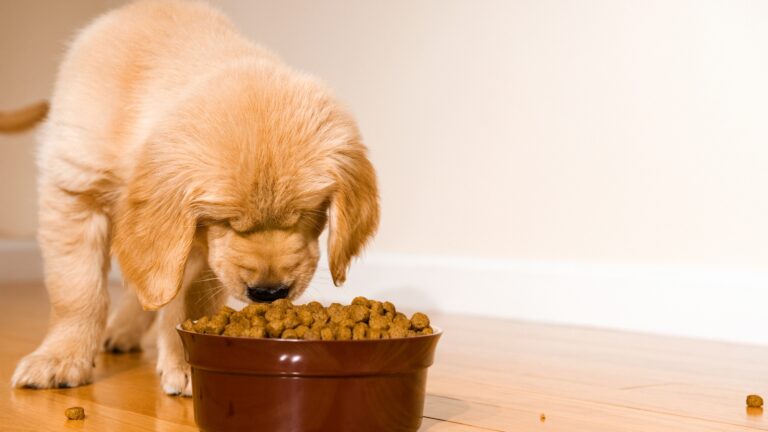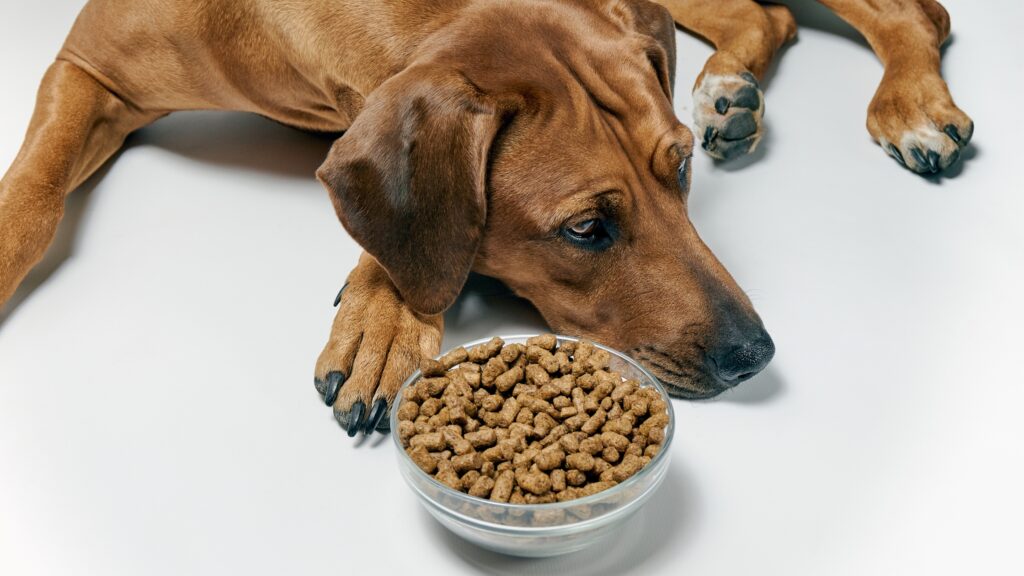
Introduction to Why Your Dog Won’t Eat Kibble but Eats Everything Else
Is your dog turning up its nose at kibble but eagerly eat up everything else? This puzzling behavior can be frustrating for pet owners trying to ensure their furry friend gets a balanced diet. Understanding why your dog won’t eat kibble but eats everything else is crucial for addressing the issue and finding a solution that works for both you and your pet. This article will delve into the various reasons behind this behavior, from health-related issues to behavioral and environmental factors, and provide practical tips to encourage your dog to eat kibble.
ALSO READ: Effective Dog Weight Loss Tips without Compromising Nutrition
Health-Related Reasons (Dog Won’t Eat Kibble but Eats Everything Else)
Dental Problems
One common reason why dogs refuse to eat kibble is dental problems. Dogs with broken teeth, gum disease, or oral infections may find it painful to chew hard kibble. Symptoms of dental issues include drooling, bad breath, and reluctance to eat. If you suspect your dog has dental problems, it’s essential to visit the vet for a thorough examination and appropriate treatment. Solutions may include dental cleanings, tooth extractions, or switching to softer food options.
Digestive Issues
Digestive problems can also cause dogs to avoid kibble. Conditions like acid reflux, food allergies, or intolerances can make kibble uncomfortable to digest. If your dog shows symptoms such as vomiting, diarrhea, or excessive gas, consult your vet to identify any underlying digestive issues. Your vet may recommend dietary adjustments or prescribe medications to alleviate the problem.
Allergies and Intolerances
Food allergies and intolerances are other potential culprits. Some dogs are allergic to common ingredients in kibble, such as chicken, beef, or grains. Identifying food allergies can be challenging, but signs include itching, ear infections, and gastrointestinal problems. If you suspect a food allergy, your vet may suggest an elimination diet to pinpoint the allergen. Once identified, switching to a hypoallergenic kibble can help.
Aging and Sensory Decline
As dogs age, their senses of smell and taste may decline, making kibble less appealing. Additionally, senior dogs may develop arthritis or other conditions that make it difficult to eat from a bowl on the ground. To address this, consider raising the food bowl or switching to a softer, more palatable food designed for senior dogs.
Behavioral and Environmental Factors (Dog Won’t Eat Kibble but Eats Everything Else)

Picky Eating Habits
Picky eating is a common issue, especially if dogs are frequently given treats or table scraps. Over time, dogs may develop a preference for these more enticing options, leading them to refuse kibble. To combat picky eating, gradually reduce the number of treats and human food, and encourage your dog to eat kibble by mixing it with small amounts of wet food or broth.
Anxiety and Stress
Anxiety and stress can significantly impact a dog’s eating habits. Changes in the environment, such as moving to a new home or the introduction of a new pet, can cause stress and lead to a refusal to eat kibble. To reduce anxiety, maintain a consistent routine, create a calm feeding environment, and use positive reinforcement to encourage your dog to eat.
Routine and Feeding Schedule
Dogs thrive on routine, and irregular feeding schedules can lead to confusion and food refusal. Establishing a consistent feeding routine helps your dog know when to expect meals and can make them more likely to eat kibble. Stick to regular feeding times and avoid free-feeding, where food is left out all day.
Environmental Changes
Environmental changes, such as new surroundings or changes in household dynamics, can affect a dog’s eating habits. If you’ve recently moved or made significant changes at home, your dog may need time to adjust. During this transition period, provide a stable and familiar feeding environment to help your dog feel more comfortable.
Quality and Type of Kibble (Dog Won’t Eat Kibble but Eats Everything Else)
Flavor and Texture Preferences
Dogs, like humans, have preferences for certain flavors and textures. If your dog won’t eat kibble but eats everything else, they might simply dislike the taste or feel of their current kibble. Experiment with different brands, flavors, and textures to find one that your dog enjoys. Transition gradually to avoid digestive upset.
Nutritional Content
Not all kibble is created equal. Low-quality kibble may lack the necessary nutrients and taste that dogs crave. High-quality, nutritious kibble can make a significant difference in your dog’s willingness to eat. Look for kibble with high meat content, natural ingredients, and no artificial additives.
Kibble Size and Shape
The size and shape of kibble can also affect a dog’s willingness to eat it. Small dogs or those with dental issues may struggle with large, hard kibble. Choose a kibble size and shape that is appropriate for your dog’s size and chewing ability. Some brands offer specially formulated kibble for small breeds or dogs with dental problems.
Freshness and Storage
Kibble that is stale or improperly stored can lose its appeal. Ensure that you store kibble in an airtight container to maintain its freshness and flavor. Check the expiration date and avoid buying large quantities that may go stale before they are consumed. Fresh kibble is more likely to entice your dog to eat.
Customer Reviews and Testimonials (Dog Won’t Eat Kibble but Eats Everything Else)
Positive Experiences
Many dog owners have shared their success stories of transitioning their dogs to new kibble. For example, Sarah from Philadelphia said, “After trying several brands, I finally found a kibble that my picky eater loves. The gradual transition method worked wonders!”
Veterinary Recommendations
Veterinarians often recommend specific kibble brands that are formulated to meet the nutritional needs of dogs. Consulting with your vet can help you choose a high-quality kibble that your dog will enjoy. For instance, Dr. Smith from New York suggests, “Choosing a vet-recommended brand ensures your dog gets the nutrients they need without compromising on taste.”
Community Feedback
Online forums and communities are excellent resources for finding tips and recommendations from other dog owners. Websites like Reddit and specialized dog forums often have threads dedicated to picky eaters and kibble suggestions. Engaging with these communities can provide valuable insights and options you might not have considered.
Personal Anecdotes
Hearing from other dog owners who have faced similar challenges can be reassuring. Many have found success through trial and error, and their stories can inspire you to keep trying. For example, Tom from California shared, “My dog had severe dental issues, and our vet recommended a specific type of kibble designed for dental health. Not only does my dog love it, but his dental health has also improved significantly.”
Practical Tips for Encouraging Kibble Consumption (Dog Won’t Eat Kibble but Eats Everything Else)
Mixing Kibble with Wet Food
Combining kibble with a small amount of wet food can enhance its flavor and make it more appealing. Start with a small ratio of wet food to kibble and gradually decrease the wet food as your dog becomes accustomed to the kibble.
Adding Toppers and Enhancers
Food toppers, such as cooked chicken, vegetables, or special gravy, can make kibble more palatable. Ensure that these additions are healthy and do not disrupt your dog’s balanced diet. Popular brands offer a variety of toppers specifically designed to complement kibble.
Warming the Kibble
Warming up kibble slightly can release its aroma, making it more enticing for your dog. Ensure the food is not too hot to avoid burns. This simple technique can make a significant difference in your dog’s interest in their meal.
Creating a Positive Mealtime Environment
Establishing a calm and positive feeding environment is crucial. Reduce distractions, such as noise and activity, during mealtime. Create a designated feeding area where your dog feels safe and comfortable. Positive reinforcement, such as praise and treats, can encourage your dog to eat kibble.
Conclusion
Understanding why your dog won’t eat kibble but eats everything else is the first step toward finding a solution. By addressing potential health issues, behavioral factors, and dietary preferences, you can help your dog develop healthier eating habits. Consulting with your veterinarian for personalized advice is essential. Experimenting with different types of kibble and implementing practical tips can make a significant difference in your dog’s willingness to eat kibble.
FAQs (Dog Won’t Eat Kibble but Eats Everything Else)
Q1: What should I do if my dog won’t eat kibble? A: If your dog persistently refuses kibble, consult your veterinarian to rule out any underlying health issues and consider trying different types of kibble.
Q2: Can changing the kibble brand help? A: Yes, experimenting with different brands, flavors, and textures of kibble can help find one that your dog enjoys.
Q3: How can I tell if my dog has a food allergy? A: Signs of food allergies in dogs include itching, ear infections, and gastrointestinal problems. Consult your vet for an elimination diet to identify the allergen.
Q4: Is it okay to mix kibble with human food? A: Mixing kibble with small amounts of healthy human food, such as cooked chicken or vegetables, can make it more appealing. Ensure it does not disrupt the balanced diet.
Q5: What are some signs of dental problems in dogs? A: Symptoms of dental issues in dogs include drooling, bad breath, and reluctance to eat hard food. A vet visit is necessary for diagnosis and treatment.